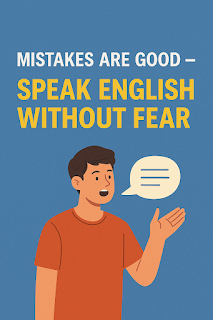Fluency vs Accuracy

Fluency vs Accuracy – What is More Important for You? By: Slow English Practice Team When I first started teaching English to beginners and intermediate learners, I heard the same question again and again from students. “ Should I focus on fluency or accuracy?” Honestly, even I weren’t sure at the beginning. As teachers and learners ourselves, I also used to chase perfect grammar, flawless sentences, and “correct” English — every time. But after teaching hundreds of students and learning from our own journey, I have discovered something very important. 👉 Fluency is more important than accuracy — especially when you're starting. Let’s explain why, based on experience. ✅ What Is Fluency? Fluency means •. You speak smoothly without long pauses •. You express ideas clearly •. You don’t always stop to think about grammar •. You can keep a conversation going It’s like water flowing — no...




